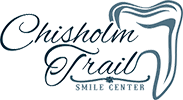At Chisholm Trail Smile Center, we want to be available for our patients when an emergency strikes. If you have a dental situation that cannot wait, call us to let us know the nature of your emergency, and we’ll make time for you!
If you have been in accident or sustained an injury that may involve broken bones or a bleeding wound, always seek medical attention before you call the dentist! Otherwise, call our office and we’ll arrange an appointment as soon as possible.
Need a Duncan, OK Emergency Dentist? Call us at (580) 255-4880! Not having an emergency at the moment? Save time by putting our number in your phone today under “emergency dentist.”
A Knocked-Out Tooth
A knocked-out tooth is always considered a dental emergency. Why? In many cases, it’s possible to re-attach the tooth if it is handled correctly, and if you can get to a dentist fast enough.
If a tooth has been knocked out:
- Put the tooth in a small, clean container of milk, water, or saliva.
- Do not clean the tooth, as you may accidentally remove the connective tissues that may make reattachment possible.
- Bite down on a clean cloth or sterile gauze if you are experiencing any bleeding.
- Call Chisholm Trail Smile Center at (580) 255-4880 and let us know you have a knocked-out tooth you are bringing in. Leave a message with our answering service if it is after hours and a member of our staff will call you back promptly.
Do not try to reattach the tooth the tooth yourself. Always seek the help of a professional, as improper pressure on the tooth or gum tissue can lead to infection or injury.
If your tooth cannot be reattached, we can help you understand your options for tooth replacement, such as a dental bridge or dental implant and crown.
A knocked-out baby tooth is not typically considered an emergency. Baby teeth should not be reattached, as this may damage the adult teeth developing in the jaw. Depending on the tooth and age of the child, the tooth may need to be replaced with a prosthetic to preserve the child’s dental function and proper speech.
Broken, Chipped, or Cracked Tooth
It doesn’t take much to break a tooth—a bike accident, sports mishap, or injury to the face can easily create enough pressure to fracture a tooth. Although a broken tooth may seem like an emergency, unless you are in pain, you can take your time getting to the dentist. Depending on the size of the break or chip, we may treat you with a crown, veneer, or dental bonding to restore the appearance and function of the tooth.
If the tooth has a deep crack that extends beneath the gum line or causes sensitivity, call us right away, so we can arrange a next-available appointment for you. A deep crack can leave the tooth vulnerable to infection and should not be ignored.
Damaged Dental Work
It can happen to anyone; a hard bit of nut shell in a brownie or an unpopped popcorn kernel is often all it takes to break or dislodge a crown. Sticky foods and candies are often the cause behind a dislodged filling, especially if it’s approaching the end of its lifespan.
If your dental work comes loose, don’t panic. Call us, and we’ll arrange a next-available appointment for you. If you can replace the crown or filling, do this. This will protect the tooth until we get the chance to look at it. If the crown or filling does not want to stay in place, you can usually find temporary dental cement in a “dental repair kit” from your local drugstore. Even a small piece of chewed sugarless gum can provide enough adhesion to keep it in place and prevent pain and sensitivity until your appointment.
Severe Toothache
The worst of all dental emergencies is the dreaded severe toothache. When you have a throbbing toothache, there’s nothing else you want to do except get to the dentist. You can’t eat, sleep, or carry on with your usual routine, as the pain is often excruciating.
A severe toothache is often the result of decay that reaches the inside of the tooth (where the nerve endings are) and we will treat you with a root canal therapy and filling to stop the pain and restore your tooth. A bad toothache does not always indicate the presence of a cavity; sometimes a crack, particle of food, or gum injury can be equally painful. Regardless of the cause, we will get to the bottom of your pain, and fix your tooth if possible.







